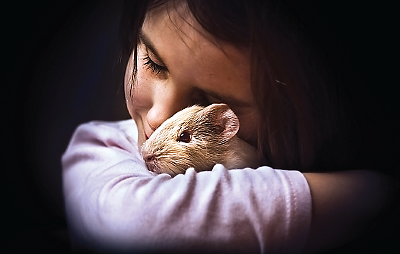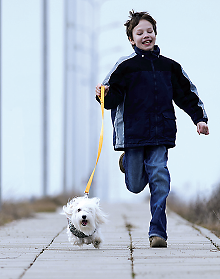Pets of Any Type May Improve Behavior in Children With ASD
Abstract
New evidence supports the value of animal therapy for kids with autism spectrum disorder and broadens options for families who cannot have or do not want dogs.
Dog may be man’s best friend, but a new survey involving parents of children with autism spectrum disorder (ASD) found that having any animal companion in a home can help improve a child’s social skills.

The study, which involved 70 families, found that children who lived with a pet (this study included owners of birds, fish, rodents, and even a spider) had higher levels of assertiveness and were more likely to engage in behaviors such as introducing themselves, asking for information, and responding to questions.
These findings are far from definitive, acknowledged Gretchen Carlisle, Ph.D., R.N., a fellow at the University of Missouri College of Veterinary Medicine, who conducted this study. She noted that the parents who chose to participate likely do not represent every pet owner’s experience, and the high rate of pet owners in the survey (57 of 70 families) limits generalizations about ASD children in non-pet-owning homes.
Still, it shows a positive trend toward the value that an animal—any animal—can bring to a household in which a child has ASD. Much of the work in animal therapy for ASD has focused on dogs, particularly trained service dogs, but issues such as cost, living space, and allergies may make therapy dogs impractical for many families.
In addition, Carlisle stressed that like their peers, each child with ASD is unique.
“Dogs are good for some kids with autism but might not be the best option for every child,” she said. “Other pets such as cats, horses, or rabbits might be better suited to other children with autism and their particular sensitivities and interests. For example, if they are sensitive to sounds, then a dog, which can bark loudly, may not provide the best match.”

Part of Carlisle’s survey involved assessing the children’s reported attachment to their pets, and the results indicated that the children formed stronger attachments to smaller dogs than to medium-sized or large dogs. This may reflect a sensitivity to size for many children with ASD, though more assessments in this regard need to be done.
As for people who may be unwilling or unable to commit to pet ownership, animal interactions can still provide benefits. A study published in PLOS ONE in February 2013 found that children with ASD who engaged in free-play sessions with guinea pigs during school showed more positive social behaviors than children who free-played with toys. Another recent report found social improvements in children who participated in a nine-week program of working with and caring for horses.
This doesn’t mean that Fido should worry about losing his place as man’s faithful companion—dogs still provide many valuable services to people with special needs. Rather, these findings broaden the spectrum of assistance options for children with ASD and their families, highlighting that for every child, there may be a companion who can help him or her develop important social skills.
Carlisle’s study, which was published in the Journal of Autism and Developmental Disorders, was supported by Sigma Theta Tau–Alpha Iota chapter. ■
An abstract of “The Social Skills and Attachment to Dogs of Children With Autism Spectrum Disorder” can be accessed here.



